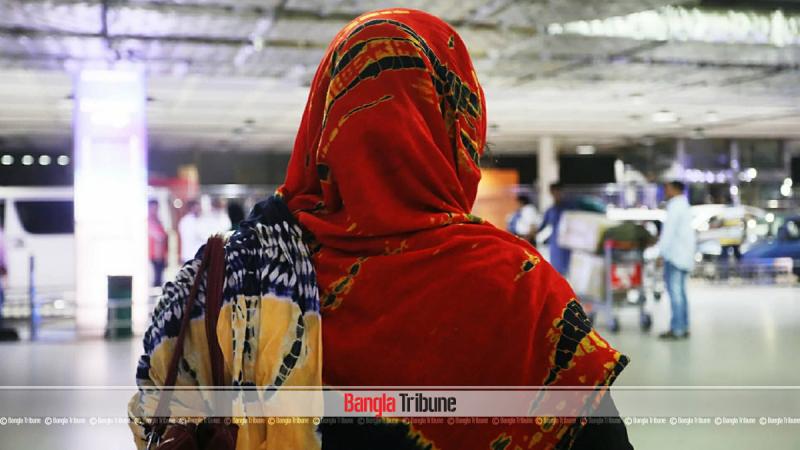 Bangladeshi women, who had gone to Saudi Arabia to work as house helps, alleged their employers of breach of contract.
Bangladeshi women, who had gone to Saudi Arabia to work as house helps, alleged their employers of breach of contract.
In February, 2015, Dhaka signed an MoU with the Saudi private recruiting agencies to send domestic aide under 12 categories, opening a door to 60,000 female workers.
The next year, the middle eastern, Bangladesh's largest overseas labour market, lifted a seven-year ban on recruitment of Bangladeshi male workers.
Under the MoU on female worker recruitment, a worker must be paid between 1,200 and 1,000 Saudi riyals as a monthly wage.
But, most of the female returnees claimed of getting paid below 800 riyals, which Bangladesh Association of International Recruiting Agencies (BAIRA) said is difficult to prove.
According to these workers, amount of the wage on job contract is kept blank, which employers fill at their will. Many employers even do not comply with the rule to pay worker’s salary in bank accounts.
Besides, domestic aides are entitled at least 9 hours off every day, a weekly holiday, clean and hygienic accommodation, proper food, clothing and other necessary daily items.
Employers will have to also grant paid leave for sickness as well bearing the medical cost.
Several female workers said that their passport and work permits were not with them, even though the conditions clearly stated it has to be in their possession.
Most of them have returned to Bangladesh with travel documents issued by the Bangladesh embassy.
Another 80 women returned Bangladesh after BRAC Migration Porgamme appealed for 120 workers.
On Jun 29 this year, 29 KSA returnees landed in Dhaka airport by an Air Arabia flight. One of them was Nargis Akater, not her real name, spoke to Bangla Tribune.
Explaining why returned home, she said, “I went to Saudi Arabia nine months ago and but spent four months in jail.”
“They didn’t give me food, didn’t pay me. When I asked for it they assaulted me. They even beat me if I wanted to contact my family.
“My employer seized my passport, gave me no money, I’ve returned with nothing. It’s my request to you all if you can please stop sending female workers to Saudi Arabia,” Nargis lamented.
Sharifa (not her real name) also alleged that her employer fixed her salary at 1,000 riyals, which was actually 800 riyals. She, however, earned nothing.
“I received no salary and came home empty handed,” she said.
Several hundred women workers are now in a jail in Jeddah after their employers sued them. They can’t return home until the cases is settled. Some of them have even been staying there for 2 to 3 years, according to the KSA returnees.
Every day at least two to three women take shelter at the safe homes in Jeddah and Riyadh with already another 100 living there.
Monwara, who had stayed in Riyadh for two and half a year, was one of the 29 returnees.
“My employer often tortured. I escaped and took shelter at the embassy. I left my salary for eleven months. I had stayed for a week at the jail before I came home,” Monwara said.
Brushing aside all these allegations, BAIRA Joint Secretary Shamim Ahmed Chowdhury urged the victims to complain through the proper channel.
“No one has come up with these allegations to us. These issues can be addressed immediately if gone through the proper channel,” he told Bangla Tribune.
Citing employers are bound to pay in line with the MoU, Chowdhury said, “It’s clearly said that maximum salary will be 1,200 riyals and the minimum at 1,000.”
Women from Bangladesh go to 18 countries including Saudi Arabia, United Arab Emirate, Kuwait, Qatar, Oman, Bahrain and Lebanon to earn better.
Data from Bureau of Manpower, Employment and Training (BMET) shows 1,219,925 women went abroad in 2017, which was 19 percent of total migrant workers.
 National
National
41475 hour(s) 18 minute(s) ago ;
Evening 10:12 ; Thursday ; Jul 10, 2025
Saudi female returnees allege breach of contract
Send
Saddif Ovee
Published : 08:00, Jun 10, 2018 | Updated : 08:07, Jun 10, 2018
Published : 08:00, Jun 10, 2018 | Updated : 08:07, Jun 10, 2018
0 ...0 ...
Topics: Top Stories
- KOICA donates medical supplies to BSMMU
- 5 more flights to take back British nationals to London
- Covid19: Rajarbagh, Mohammadpur worst affected
- Momen joins UN solidarity song over COVID-19 combat
- Covid-19: OIC to hold special meeting
- WFP begins food distribution in Cox’s Bazar
- WFP begins food distribution in Cox’s Bazar
- 290 return home to Australia
- Third charter flight for US citizens to return home
- Dhaka proposes to postpone D8 Summit
Unauthorized use of news, image, information, etc published by Bangla Tribune is punishable by copyright law. Appropriate legal steps will be taken by the management against any person or body that infringes those laws.
Bangla Tribune is one of the most revered online newspapers in Bangladesh, due to its reputation of neutral coverage and incisive analysis.
F R Tower, 8/C Panthapath, Shukrabad, Dhaka-1207 | Phone: 58151324; 58151326, Fax: 58151329 | Mob: 01730794527, 01730794528


